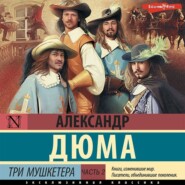По всем вопросам обращайтесь на: info@litportal.ru
(©) 2003-2024.
✖
The Last Vendée
Настройки чтения
Размер шрифта
Высота строк
Поля
Michel affected indifference, but he was listening with all his ears.
"You say to me, 'Père Courtin, you are mistaken as to your rights; you cannot, either as mayor or the holder of property put the Marquis de Souday's dogs in the pound; you have a right to an indemnity, but this indemnity must be amicably agreed upon.' To which I, Père Courtin, reply: 'If you are concerned in it, Monsieur Michel, I agree; I know your generosity.' On which you say: 'Courtin, you must give me those dogs; the rest is my affair.' And I reply: 'There are the dogs, Monsieur Michel; as for the indemnity, hang it! a gold piece or two will play the game, and I don't want the death of the sinner.' Then, don't you see? you write a bit of a note to the marquis; you have found the dogs, and you send them back by Rousseau or La Belette, for fear he should be anxious. He can't help thanking you and inviting you to call and see him. Perhaps, however, to make quite sure, you had better take the dogs back yourself."
"That will do, Courtin," said the young baron. "Leave the dogs with me; I'll send them to the marquis, not to make him invite me to the castle, for there's not a word of truth in all you have been supposing, but because, between neighbors, it is a courteous thing to do."
"Very good, – so be it; but, all the same, they are two pretty slips, those girls. As for the indemnity-"
"Ah, yes," said the young baron, laughing, "that's fair; you want the indemnity for the injury the hounds did you by passing over my land and eating up half the hare which Bertha killed."
And he gave the farmer what he happened to have in his pocket, which was three or four louis. It was lucky for him there was no more, for he was so delighted at finding a way to present himself at the château de Souday that he would willingly have given the farmer ten times that sum if by chance it had been in his purse.
Courtin cast an appreciative eye on the golden louis he had just received under the head of "indemnity," and putting the leash in the hand of the young man he went his way.
But after going a few steps he turned round and came back to his master.
"Don't mix yourself up too much with those people, Monsieur Michel," he said. "You know what I told you just now about those messieurs at Torfu and Montaigu; it is all true, and mark my words, in less than fifteen days there'll be a fine row."
This time he departed for good, singing "La Parisienne," for the words and tune of which he had a great predilection.
The young man was left alone with the two dogs.
X.
IN WHICH THINGS DO NOT HAPPEN PRECISELY AS BARON MICHEL DREAMED THEY WOULD
Our lover's first idea was to follow Courtin's original advice and send the dogs back to the Marquis de Souday by Rousseau and La Belette, two serving-men belonging partly to the château and partly to the farm, who owed the nicknames by which Courtin has presented them to the reader, one to the ruddy color of his hair, the other to the resemblance of his face to that of a weasel whose obesity La Fontaine has celebrated in one of his prettiest fables.
But after due reflection the young man feared that the Marquis de Souday might content himself with sending a simple letter of thanks and no invitation. If, unfortunately, the marquis should act thus, the occasion was lost; he would have to wait for another; and one so excellent as this could not be expected to happen every day. If, on the contrary, he took the dogs back himself he must infallibly be received; a neighbor would never be allowed to bring back valuable strayed dogs in person, over a distance of ten or a dozen miles, without being invited in to rest, and possibly, if it was late, to pass the night at the castle.
Michel pulled out his watch; it was a little after six. We think we mentioned that Madame la Baronne Michel had preserved, or rather had taken a habit of dining at four o'clock. In her father's house Madame la baronne had dined at mid-day. The young baron had therefore ample time to go to the castle.
But it was a great resolution to take; and decision of character was not, as we have already informed the reader, the predominating feature in Monsieur Michel's character. He lost a quarter of an hour in hesitation. Fortunately, in these May days the sun did not set till eight o'clock. Besides, he could properly present himself as late as nine.
But then-perhaps the young ladies after a hunting-day would go to bed early? It was not, of course, the marquis whom the baron wanted to see. He wouldn't have gone a mile for that purpose; whereas to see Mary he felt he could march a hundred. So at last he decided to start at once.
Only, and this was indeed a hindrance, he suddenly perceived that he had no hat. To get it he must return to the château, at the risk of encountering his mother and all her cross-questioning, – whose dogs were those? where was he going? etc.
But did he really want a hat? The hat, that is, the lack of it, would be set down to neighborly eagerness; or else the wind had taken it; or else a branch had knocked it down a ravine, and he could not follow it on account of the dogs. At any rate, it was worse to encounter his mother than to go without his hat; accordingly he started, hatless, leading the dogs in the leash.
He had hardly made a dozen steps before he discovered that it would not take him the seventy-five minutes he had calculated to get to Souday. No sooner were the hounds aware of the direction in which their new leader was taking them than it was all he could do to hold them back. They smelt their kennel, and dragged at the leash with all their might; if harnessed to a light carriage they would have made the distance in half an hour. The young man, forced to keep up with them at a trot, would certainly do it in three-quarters.
After twenty minutes of this lively gait Michel reached the forest of Machecoul, intending to make a short cut through it. It was necessary to mount a rather steep slope before entering the wood, and when he reached the top he halted to get his breath. Not so with the dogs, who got their breath while running and wanted to keep on their way. The baron opposed this desire by planting himself firmly on his feet and leaning back while they dragged him forward. Two equal forces neutralize each other, – that is one of the first principles of mechanics. The young baron was the stronger, therefore he neutralized the force of the two dogs.
This done, and quiet resulting, he took out his handkerchief to mop his forehead. While he did so, enjoying the cool freshness of the breeze as it breathed on his face from the invisible lips of evening, he fancied he heard a cry wafted upon that breeze. The dogs heard it too, and they answered it with that long, mournful cry of a lost animal. Then they began to pull at their chain with fresh energy.
The baron was now rested and his forehead was mopped; he was therefore quite as ready as Galon-d'Or and Allégro to continue the way; instead of leaning back he leaned forward, and his little jog-trot was resumed.
He had scarcely gone a few hundred steps before the same cry, or rather call, was repeated, but very much nearer and therefore more distinct than the first. The dogs answered by a long howl and a more determined drag on their collars. The young man now felt certain that the cry proceeded from some one in search of the dogs, and he bawled to them (hauler). We beg pardon of our readers for using so unacademic a word, but it is the one our peasants use to represent the peculiar shout of a huntsman calling in his dogs. It has the advantage of being expressive; and besides (for a last and better reason), I know no other.
About six hundred paces farther on the same cry was repeated for the third time by the seeking man and the missing hounds. This time Galon-d'Or and Allégro tore along with such vigor that their conductor was almost carried off his feet, and was forced to make his jog-trot a quick trot and his quick trot a gallop.
He had scarcely kept along at that pace for three minutes before a man appeared among the trees, jumped the ditch beside the road, and barred the baron's way. The man was Jean Oullier.
"Ah, ha!" he cried; "so it's you, my pretty man, who not only turn my dogs off the trail of the wolf I am hunting to that of a hare you're after, but actually couple them, and lead 'em in a leash!"
"Monsieur," said the young man, all out of breath, "if I have coupled them and led them it is to have the honor of returning them to Monsieur le Marquis de Souday myself."
"Ho! yes, that's a likely story, – with no hat on your head! You needn't trouble yourself any further, my good sir. Now you've met me I'll take them back myself."
So saying, and before Monsieur Michel had time to oppose or even guess his intention, Jean Oullier wrenched the chain from his hand and threw it on the necks of the hounds, very much as we throw a bridle on the neck of a horse. Finding themselves at liberty the dogs darted at full speed in the direction of the castle, followed by Jean Oullier, whose pace was equal to theirs as he cracked his whip and shouted: -
"Kennel! kennel, scamps!"
The whole scene was so rapid that dogs and man were nearly out of sight before the young baron recovered himself. He stopped short helplessly in the roadway, and must have been there ten minutes, gazing, with his mouth open, in the direction Jean Oullier and the dogs had taken, when the soft and caressing voice of a young girl said close beside him: -
"Gracious goodness! Monsieur le baron, what are you doing here at this hour, bareheaded?"
What he was doing, the young man would have been rather puzzled to say; in point of fact he was following his hopes, which had flown away in the direction of the castle, whither he dared not follow them. He turned round to see who spoke to him, and recognized his foster- sister, the daughter of the farmer Tinguy.
"Oh, it is you, Rosine, is it?" he said; "what are you doing here yourself?"
"Monsieur le baron," said the girl, in a tearful voice, "I have just come from the château de la Logerie, where Madame la baronne treated me very unkindly."
"Why so, Rosine? You know my mother loves you and takes care of you."
"Yes, as a general thing; but not to-day."
"Why not to-day?"
"She has just had me turned out of the house."
"Why didn't you ask for me?"
"I did ask for you, Monsieur le baron, but they said yon were not at home."
"I was at home; I have only just come out, my dear; for fast as you may have come, I'll answer for it I came faster!"
"Maybe; it is likely enough, Monsieur le baron; for when Madame was so cruel to me I thought I would come and ask the wolves to help me, but couldn't decide at once to do so."
"What help can the wolves give you?"
Michel forced himself to utter the word.
"The help I wanted Madame la baronne to give me, for my poor father who is very ill."
"What is the matter with him?"
"A fever he caught in the marshes."

















